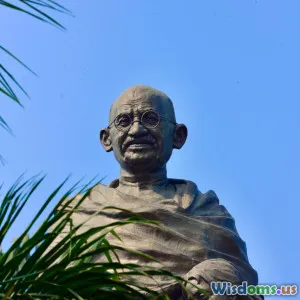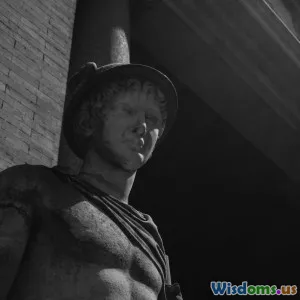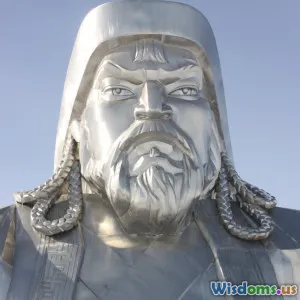
The Legacy of Influential Figures in History
7 min read Explore the profound impact of history's influential figures and how their legacies shape our world today. (0 Reviews)
The Legacy of Influential Figures in History
History is a tapestry woven with the stories and deeds of individuals whose lives left an indelible mark on humanity’s journey. From revolutionaries to visionaries, these influential figures shaped the world in profound ways. Exploring their legacies offers not only a window into the past but also enduring lessons that inspire progress.
Introduction: The Power of a Single Life
It’s said that one person can change the course of history — and countless examples validate this claim. The legacies of influential individuals often extend far beyond their lifetimes, affecting culture, politics, science, and human rights worldwide. Their actions show how leadership, courage, and vision ignite societal transformations.
But what makes a legacy truly lasting? Is it revolutionary ideas, courageous deeds, or unique innovations? This article explores the multifaceted legacies of some key historical figures, uncovering how their contributions ripple through time and continue to shape our modern world.
Revolutionary Leaders and Political Visionaries
Mahatma Gandhi: The Philosophy of Nonviolence
Mahatma Gandhi’s legacy centers on nonviolent resistance, which redefined political struggle. Leading India’s independence movement against British colonial rule, Gandhi’s commitment to ahimsa (nonviolence) inspired countless civil rights movements globally. His influence stretches to figures like Martin Luther King Jr. and Nelson Mandela, who adopted nonviolent tactics in their quests for justice.
Statistically, Gandhi’s movement mobilized millions, culminating in India’s independence in 1947 — a pivotal moment reshaping colonial geopolitics. His legacy teaches that ethical leadership and peaceful persistence can overcome oppression.
Abraham Lincoln: Emancipation and Unity
Abraham Lincoln’s presidency during the American Civil War preserved the Union and led to the abolition of slavery through the Emancipation Proclamation (1863). His deep commitment to human equality transformed the United States’ political landscape and provided moral clarity during its darkest times.
Lincoln’s Gettysburg Address remains a symbolic rallying cry for democracy and freedom. His legacy highlights how visionary leadership and conviction can steer a nation toward justice and healing.
Pioneers of Science and Innovation
Marie Curie: Breaking Barriers in Science
Marie Curie’s groundbreaking research on radioactivity won her two Nobel Prizes in Physics and Chemistry. As the first woman honored with this distinction, Curie shattered gender norms and expanded scientific frontiers.
Her discoveries catalyzed advances in medical treatments and nuclear physics. Beyond her research, Curie’s dedication paved the way for women’s participation in STEM fields, transforming scientific culture.
Nikola Tesla: The Architect of Modern Electricity
Nikola Tesla’s inventions underpin much of our modern electrical infrastructure. His innovations in alternating current (AC) electrical systems revolutionized power distribution globally. Although overshadowed during his lifetime, Tesla’s visionary ideas — including early concepts of wireless communication — set the stage for contemporary technology.
Tesla’s legacy exemplifies how creativity and persistence in science can unlock revolutionary possibilities, shaping everyday life in profound ways.
Cultural Icons and Social Reformers
Martin Luther King Jr.: Civil Rights and Equality
Dr. Martin Luther King Jr.’s leadership in the American civil rights movement advanced racial equality and social justice. His charismatic oratory, epitomized by the “I Have a Dream” speech, galvanized a mass movement challenging systemic discrimination.
The Civil Rights Act of 1964 and Voting Rights Act of 1965 were landmark legislative outcomes influenced by King’s nonviolent activism. His legacy inspires ongoing struggles for human rights worldwide, underscoring the power of resilience and moral vision.
Frida Kahlo: Challenging Identity and Expression
Frida Kahlo’s legacy lies vibrant at the intersection of art, identity, and politics. Through intensely personal and politically charged paintings, Kahlo explored themes of gender, indigenous culture, and pain, influencing feminist and queer movements.
Her life and work invite fresh perspectives on individuality and cultural pride, transforming our understanding of self-expression.
The Nature of Legacy: Lessons and Challenges
Beyond Memory: The Dynamic Aspect of Legacy
Historical legacies are not static; they evolve as societies reinterpret them through contemporary lenses. For example, debates around figures like Christopher Columbus reveal how legacies can be contested and re-evaluated based on new values and insights.
Effective legacies often combine foundational innovation with adaptability, allowing continuous relevance.
Inspiring Action Today
These influential figures encourage reflection on individual and collective responsibility. Whether through leadership, creativity, activism, or courage, their stories motivate us to address today’s challenges with similar passion.
For instance, young climate activists today draw inspiration from past reformers, channeling urgent messages about sustainability and justice.
Conclusion: The Enduring Echo of Greatness
The legacies of influential figures remind us that history is shaped by individuals whose visions and deeds transcend their eras. From Gandhi’s peace-driven revolution to Curie’s scientific breakthroughs, these legacies illuminate pathways to progress.
By studying them deeply and critically, we not only honor their contributions but also gain guidance to shape a more just, innovative, and compassionate future. The enduring echo of greatness calls on each generation to contribute meaningfully to the world’s story.
“Life’s most persistent and urgent question is, ‘What are you doing for others?’” — Martin Luther King Jr.
This timeless query invites reflection on how we each build legacies that matter.
Rate the Post
User Reviews
Popular Posts




















